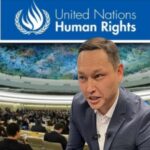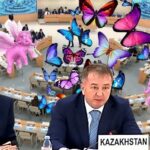Joint statement by Kazakhstan International Bureau for Human Rights and Rule of Law, Nota Bene, Turkmen Initiative for Human Rights and International Partnership for Human Rights*
As part of a broader trend in the former Soviet Union, civil society in Central Asian countries has recently come under growing pressure. While last year’s Maidan events and the current economic downturn have triggered new fears of popular discontent and protests among the region’s regimes, civil society groups have increasingly been singled out for negative and hostile rhetoric, and arguments about ensuring national security and stability increasingly invoked to justify excessive, arbitrary and discriminatory restrictions on freedom of association and assembly. In this statement, we highlight current major concerns regarding legislation and policies affecting civil society in Kazakhstan, Tajikistan and Turkmenistan that require urgent attention and action.
When visiting Kazakhstan earlier this year, the UN Special Rapporteur on the rights to freedom of peaceful assembly and of association expressed concern that authorities treat the freedoms he monitors as privileges rather than as rights and use the need to maintain stability as an excuse to curtail them. He emphasized that this is a misguided approach and that the free exercise of freedom of assembly and association actuallycontributes to a more just and stable society by presenting authorities with unique insights into the challenges that people face and fostering accountability, participation and good governance.[i] This message is equally relevant for other Central Asian countries and should serve as a reminder for the region’s leaders of the importance of adopting a comprehensive approach to security, where the protection of fundamental rights is placed at the center.
Kazakhstan
During his Kazakhstan visit in January 2015, UN Special Rapporteur Maina Kiai concluded that “a web of laws and practices” limits the freedom of public associations to operate in this country and that the government’s approach to regulating assemblies “deprives the right of its meaning”. He stressed that this is part of a broader picture in which there is very limited space for expressing alternative views and dissent is portrayed as a threat to stability. He also deplored the lack of clarity and sense of injustice that still surround the December 2011 Zhanaozen events, when over a dozen people died in clashes with police that followed a months-long peaceful strike. He called for an independent international inquiry into them.[ii]Detailed findings from his visit will be presented in the summer.
Instead of being used to introduce more progressive provisions, the new Criminal and Administrative Codes that entered into force in Kazakhstan at the beginning of 2015 cement and reinforce problematic restrictions on freedom of association and assembly. They include: criminalization of the involvement in unregistered public associations; broad grounds for denying registration to associations or closing them down; criminal and administrative sanctions for holding unsanctioned peaceful assemblies; enhanced criminal liability for leaders and members of public associations compared to others; and a vaguely worded ban on inciting social, national and other discord. These provisions may be used to obstruct and penalize legitimate civil society activities.
New legislation restricting access to funding of NGOs may also be adopted in Kazakhstan. Draft legislation on state grant-making to NGOs under consideration by the government could resultin that a government-controlled body is entrusted with overseeing grant-making to NGOs not only of state funds, but also of funds from other sources, including foreign donors. The draft provisions state that NGOs may receive grants for certain listed areas of activities and that the use of grants will be closely monitored. Civil society members fear that the vaguely worded draft legislation could be used to impede the funding and work of NGOs that are inconvenient to the authorities, as well as to discourage foreign donors from supporting them. Following an NGO briefing held at the end of March 2015, where the draft provisions were seriously criticized, Ministry of Culture representatives expressed readiness to consider civil society recommendations for amendments. However, it remains unclear whether and to what extent this will happen.[iii]
At the Universal Periodic Review of Kazakhstan last October, the government delegation acknowledged the need to improve current legislation on freedom of assembly. The same month the UN Human Rights Committee instructed the authorities of the country to revise this legislation.[iv] However, so far, no measures are known to have been taken to this end. As previously, the organizers of any public gatherings are required to obtain permission in advance, while permission is routinely denied or assemblies only allowed in specifically designated areas located far from city centres. Peaceful protests that go ahead without advance permission are often dispersed and organizers and participants apprehended and penalized. Journalists, bystanders and accompanying children are also occasionally detained along with participants, and civil society activists and other outspoken individuals are “preventively” arrested ahead of planned protests, as happened even when UN Special Rapporteur Maina Kiai visited Kazakhstan.
Tajikistan
There are concerns that draft legislation pending consideration by Tajikistan’s parliament may be used to restrict the funding and activities of NGOs, if adopted. In November 2014, it became known that the Ministry of Justice was proposing amendments to the Law on Public Assemblies requiring NGOs to register funds from foreign and international donors with the government prior to using them. The registration procedure was not detailed and no minimum amount to which it would apply specified. It was left unclear whether local NGO funding, which is scarce in the country, also would have to be registered. These plans were widely criticized by civil society, which objected to the lack of transparency surrounding the elaboration of the draft legislation and expressed alarm that it runs counter to international standards.[v] NGOs were subsequently invited to discuss and make recommendations on the draft legislation, and the minister of justice said that registration would not entail requesting permission to use funds. The draft amendments submitted to the parliament in late March 2015 remain vaguely worded, although they have been amended to say that NGO programs using funds subject to registration “is only allowed after notifying the registration body”.
The new draft legislation was introduced in a context in which authorities already enjoy broad powers to oversee the activities of NGOs. A growing number of organizations have been singled out for intrusive inspections and, in some case, closed down or threatened with closure because of the alleged failure to comply with requirements of a technical nature. Last summer the Constitutional Court ruled that the current provisions of the Law on Public Associations that concern the closure of NGOs are unclear and should be amended; however, so far this has not happened. The adoption of the new ambiguous provisions now under consideration would reinforce the vulnerability of NGOs. It is also troubling that the government has sought to justify these by saying they are needed to meet recommendations of the Financial Action Task Force on Money Laundering, similarly to in other countries where problematic NGO legislation has been initiated. Last month the UN Committee on Economic, Social and Cultural Rights called on the Tajikistani authorities to ensure that any amendments adopted strengthen rather than weaken freedom of association.[vi]
A new Law on Assemblies adopted in Tajikistan in late 2014 is more restrictive than the previous one and limits the right to hold peaceful assemblies in ways that are not compatible with international standards. In particular, it requires the organizers of assemblies to obtain permission in advance and contains broadly worded provisions on the grounds for prohibiting assemblies, including with respect to the venues for holding them. It also does not provide for spontaneous assemblies and bans foreign citizens from participating in gatherings. The adoption of the new law, which has been argued to be needed in view of current security threats, came at a time when authorities appear to be increasingly concerned about possible mass protests. In October 2014, online calls for holding an anti-government rally in Dushanbe were followed by unprecedented security measures, widespread blocking of websites and a court decision banning the group behind the calls as “extremist”. The planned event did not take place.
Turkmenistan
New laws on freedom of association and assembly recently adopted in Turkmenistan have been touted as democratic progress by its government, which is seeking to improve its international image through legislative reforms. However, while efforts to revise and improve legislation on the exercise of fundamental rights are welcome as such, these new laws are weakened by basic restrictions and are unlikely to result in any real improvements in the absence of wide-ranging measures to create a more open society and to promote opportunities for civil society engagement outside of strict government controls.
A new Law on Public Associations, which entered into force in May 2014, introduced some improved wording over the previous law but retains a restrictive approach. It requires compulsory registration of associations, provides for strict registration rules especially for organizations operating at the national level, grants authorities wide and largely unfettered powers to oversee the activities and funding of associations and sets out broad grounds for courts to close down organizations. A new Law on Assemblies, which will enter into force in July this year, is the first-ever law of its kind in the country. It allows individuals and lawfully registered organizations to carry out pickets, rallies and other public gatherings if local authorities are informed well in advance and the venue for holding these events is agreed. At the same time, it grants local officials wide discretion to refuse to agree to assemblies on the grounds that the proposed venue is unsuitable. The law prohibits assemblies near e.g. government buildings, hospitals, schools and public transportation, as well as in other places if so decided. It also says that assemblies, as a rule, should be held in venues that will be specifically designated for this purpose. Only one-person pickets can be held without informing local authorities.
In practice, conditions for civil society engagement remain highly repressive in Turkmenistan. Independent civil society groups addressing human rights and other sensitive issues can only operate underground or in exile, and public assemblies are a rare occurrence because of the lack of awareness of citizens of their rights and the overhanging threat of reprisals for any criticism of official policies. Recently, however, Turkmen Initiative for Human Rights (TIHR) has reported about a number of incidents where citizens have carried out spontaneous protests against arbitrary campaigns to remove air conditioners from their homes[vii], gas shortages and other issues affecting their everyday lives. This has troubled authorities, which view any expression of discontent as a threat. Against that background, there are reasons to fear that the new Law on Assemblies may be used to deem spontaneous, peaceful gatherings unlawful and to intimidate and harass the initiators and participants.[viii]
In another recent development, information received by TIHR suggests that mass arrests carried out in the name of fighting terrorism in the city of Tejen in February 2015 may also have targeted individuals planning to hold a rally to protest food price hikes, unemployment and other socio-economic problems.[ix] These allegations should be investigated and any individuals detained in retaliation for seeking to exercise their right to freedom of peaceful assembly immediately released.
Recommendations
Recommendations to the authorities of Kazakhstan:
- Cooperate fully with the UN Special Rapporteur on the rights to freedom of peaceful assembly and of association in follow-up to his visit to Kazakhstan and take effective measures to implement the recommendations resulting from his visit.
- As called for by the UN Special Rapporteur and other international community representatives, allow for an international, independent inquiry into the Zhanaozen events.
- Amend provisions of the new Criminal and Administrative Codes, as well as other legislation in force that restrict freedom of association and assembly in violation of Kazakhstan’s international human rights obligations and take corresponding measures to change current practice.
- Elaborate a new Law on Assemblies to provide a legal framework that upholds rather than denies this right and refrain from moving forward with the draft legislation on grant-making to NGOs in its current format. Closely consult and cooperate with the whole spectrum of civil society organizations on any legislative initiatives affecting freedom of association and assembly.
- Respect freedom of association, assembly and expression in connection with the early presidential elections to be held on 26 April 2015. In particular, do not prevent citizens from meeting and discussing with candidates, do not obstruct peaceful protests from taking place, and do not restrict access to social media or other internet resources under the pretext of ensuring campaign silence.
Recommendations to the authorities of Tajikistan:
- Refrain from adopting the draft legislation on the registration of NGO funding that currently is under consideration given its vague wording and respect the right of NGOs to have unimpeded access to funding for their work, including from sources abroad.
- Amend provisions of the Law on Public Associations and related legislation concerning oversight and inspections, as well as suspension and liquidation of NGOs to ensure that these provisions are clear, unambiguous and fully consistent with Tajikistan’s international human rights obligations.
- Bring the provisions of the new Law on Assemblies into compliance with international human rights standards and promote conditions in which freedom of peaceful assembly can be exercised without hindrance in the country.
- Consult and involve civil society in any efforts to amend legislation directly affecting it, ensure transparency of lawmaking processes, and draw on international expert assistance and international best practices when preparing draft legislation.
Recommendations to the authorities of Turkmenistan:
- Request that independent, international experts from the ODIHR review the Law on Public Associations and the Law on Assemblies in light of Turkmenistan’s international human rights obligations and amend this legislation in full accordance with the ensuing recommendations.
- Commit to elaborating an action plan for implementing systematic reforms to open up space for civic participation and engagement in the country and seek cooperation from international organizations, human rights bodies and NGOs for this purpose.
- Allow peaceful, spontaneous protests to take place without repercussions for the organizers and participants and welcome such protests as an opportunity to obtain information on concerns held by citizens that ought to be addressed by authorities.
- Promptly investigate allegations that individuals may have been detained merely for planning to hold a peaceful rally in the city of Tejen, and immediately release anyone held on such grounds.
Recommendations to other OSCE participating States:
- Use all appropriate avenues to publicly and privately raise concerns about the issues outlined in this statement with the governments of Kazakhstan, Tajikistan and Turkmenistan and seek concrete commitments from them to improve respect for freedom of association and assembly in law and in practice. In particular, speak out against misuing concerns about national security and stability to limit freedom of association and assembly in violation of international human rights standards.
- Support the ODIHR in its efforts to provide expertise and practical assistance to the governments of the region on ensuring compliance with international human rights obligations and commitments protecting freedom of association and assembly and promoting a more enabling environment for civil society.
- Fully implement the new OSCE Guidelines on Freedom of Association and the OSCE Guidelines on Freedom of Peaceful Assembly; carry out reviews, in consultation with civil society, of national laws and practices in the light of these Guidelines; and report to the ODIHR on measures taken to implement them, thereby setting a good example for other participating States.
* This statement has been prepared on the occasion of the OSCE Supplementary Human Dimension Meeting on Freedoms of Peaceful Assembly and Association held in Vienna on 16-17 April 2015. It has been produced with financial assistance of the European Union. The contents of this document are the sole responsibility of the organizations issuing it and can in no way be regarded as reflecting the views of the European Union.
[i] See “UN expert warns Kazakhstan against using ‘stability’ as excuse to curtail rights, voices concern at surveillance of sources”, 28 January 2015 and the related statement at: http://www.ohchr.org/EN/NewsEvents/Pages/DisplayNews.aspx?NewsID=15518&LangID=E#sthash.P4X042hl.dpuf
[ii] See the previous footnote.
[iii] For more information about the concerns of civil society regarding the draft legislation, see report by Kazakhstan International Bureau on Human Rights and Rule of Law on the NGO briefing held on 27 March 2015 (in Russian), at http://bureau.kz/data.php?page=0&n_id=8075&l=ru
[iv] Views adopted by the Human Rights Committee on Communication No. 2137/2012 at its 112th session on 7-31 October 2014.
[v] See appeal signed by over 90 Tajikistani, foreign and international NGOs, “Tajikistan: Drop draft legislation restricting access to NGO funding”, 25 November 2014, at: http://www.iphronline.org/tajikistan-ngo-law-appeal-20141125.html
[vi] Par. 10 of the Concluding observations adopted by the Committee on Economic, Social and Cultural Rights on the combined second and third periodic reports of Tajikistan, 6 March 2015.
[vii] When implementing these campaigns, authorities have argued that air conditioners spoil the appearance of buildings.
[viii] On this issue, see also comments made by TIHR Chairman Farid Tukhbatullin in article by Deutsche Welle, “Туркмения: разрешение на митинги усложнит их проведение” from 13 March 2015, available at: http://www.dw.de [ix] See TIHR, “Mass arrests in the south of Turkmenistan”, 16 March 2015, at http://www.chrono-tm.org/en/2015/03/mass-arrests-in-the-south-of-turkmenistan/
SOURCE:

















